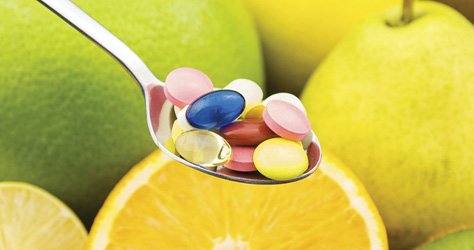Is my baby getting enough vitamins and iron?
It can be a challenge to make sure your baby is getting enough vitamins and iron in their diet. Here’s what they need and what supplements to give.
At a glance
- Sunlight is a major source of Vitamin D
- Vitamin A strengthens their immune system, helps vision and maintains healthy skin
- Repeated infections, lethargy, behavioural problems can all be signs of an iron deficiency

The Government recommends that all babies aged six months to five years are given vitamin supplements containing vitamins A, C and D everyday.
This is because it can be hard to get enough in their diet, particularly if they don’t yet eat a wide range of foods. Actually, it’s hard for anyone – adults included – to get enough vitamin D from food, as sunlight is the major source.
If you qualify for healthystart.nhs.uk and are on certain benefits or tax credits, you may qualify for free drops: ask your health visitor for details. There are so many different supplements on sale it can be hard to know which is best for your baby, so do talk to your healthcare professional.
While vitamins can be good for your baby, too many vitamins can harm them – so never double up the dose if you forgot the previous day. And watch out for accidentally overdosing by using two different supplements which may have some of the same ingredients.
Babies who are born at less than 36 weeks or who have a birth weight less than 2.5kg (5.5lbs) require extra vitamins during their first year of life because the stores of vitamins in their bodies are low. In these circumstances, vitamins will be prescribed up until your baby is one year old. You will not need extra vitamins as you should never give your baby a higher does than has been prescribed.
Pregnacare is the UK’s No1 pregnancy supplement brand, helping to keep mums and babies healthy for over 30 years.
What do vitamins A, C and D do?
Vitamin A
Strengthens their immune system, helps vision and maintains healthy skin and growth. Good sources for babies include full fat dairy products, fortified margarine-type spreads, carrots, sweet potatoes, swede and mangos, and dark green vegetables such as spinach, broccoli and cabbage.
Vitamin C
Important for general health and for looking after the immune system. Good sources include fruit such as oranges, strawberries, kiwi fruit, tomatoes and mangoes and vegetables such as peppers, potatoes and sweet potatoes.
Vitamin D
Keeps bones healthy and is also important to the immune system. Oily fish is the only good source and small amounts are found in meat and eggs. Some foods are fortified with small amounts e.g. some breakfast cereals and yogurts. It’s added to all formula milk. We get most of our vitamin D from the sunshine: in the UK that means 10-15 minutes a day of exposure (in short stretches is fine) without suncream between April and October. But be careful not to let your baby burn as it will increase their risk of skin cancer in later life. The body stores your summer vitamin D for use in the winter. Even if you get outside plenty in the summer, the Government recommends Vitamin D supplementation for the whole population, especially during autumn and winter.
As a precaution, breastfed babies from birth to age one year should be given a daily supplement containing 8.5 µg to 10 µg of Vitamin D.
Infants fed with more than 500 mL of infant formula should not receive a Vitamin D supplement, as infant formula is already fortified with Vitamin D. However, all children aged 1 to 4 should receive a Vitamin D supplement dose of 10 µg (10mcg or 400 IU) daily, all year round.
Daily Vitamin D limits:
* For infants (under 12 months) is 25 µg (25 mcg or 1000 IU)
* For children 1 to 10 years is 50 µg (50 mcg or 2000 IU).
Helping your child get enough iron
Once your baby gets to around six months old they need more iron, but you don’t need to use follow-on formula milk or supplements to get this. A balanced diet with meat, oily fish, beans, pulses (e.g. dhal, lentils and chick peas), eggs and fortified breakfast cereals should provide all they need. Breastmilk provides a small amount of iron, but babies of six months to a year will get most of their supply from solid food. If you’ve got concerns your baby isn’t getting enough, talk to your health visitor. Some of the signs of iron deficiency are: repeated infections, lethargy, behavioural problems, failure to grow at the expected rate and strange cravings like eating dirt or soil.
Tips for maximising vitamins from food
- Stir-fry or steam rather than boil vegetables as it retains more vitamins and keeps more flavour
- Use the microwave to cook veg as it uses less water, but do leave the veg to stand for a few minutes afterwards to even out any hotspots
- Lightly cook green vegetables rather than boiling them into oblivion, as much of their nutrients will be lost
- Try your baby on raw fruits and suitable vegetables as they contain the highest vitamins
- Don’t be afraid of using frozen vegetables: they are often fast-frozen within minutes of being harvested so retain their nutrients
- If you use tinned vegetables and fruit, choose products in natural juices rather than sweet syrups or salted water